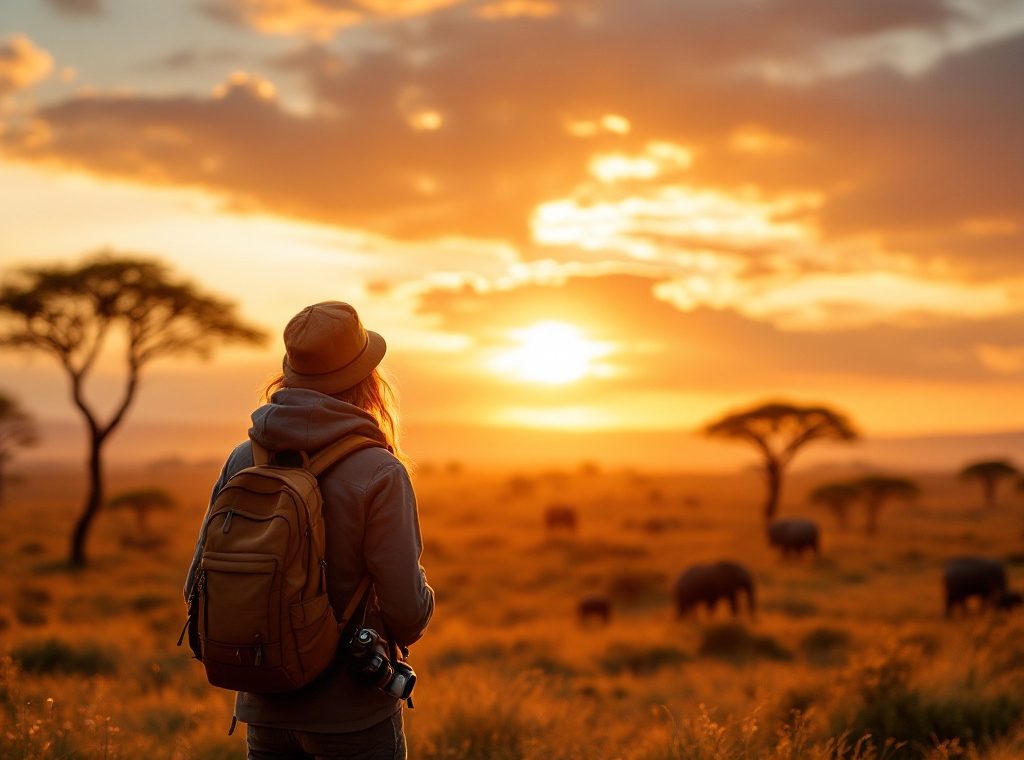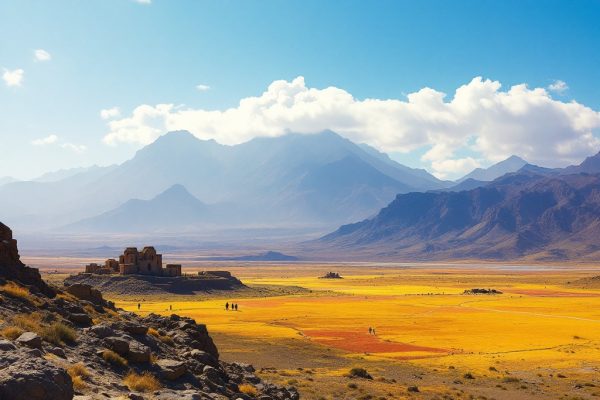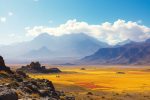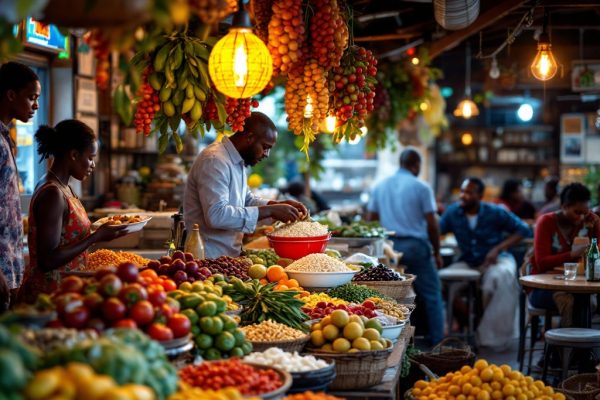Solo Travel to Africa: How to Keep Yourself Safe on the Way
Dream of exploring Africa solo? Discover how to plan an unforgettable and safe adventure! This guide provides crucial advice, from researching safe destinations like Botswana and Namibia to understanding local customs and health risks. Learn essential safety tips, including securing valuables, managing money wisely, and utilizing government registration. Prepare for a rewarding journey with our comprehensive guide – start planning your African adventure today!
Important information
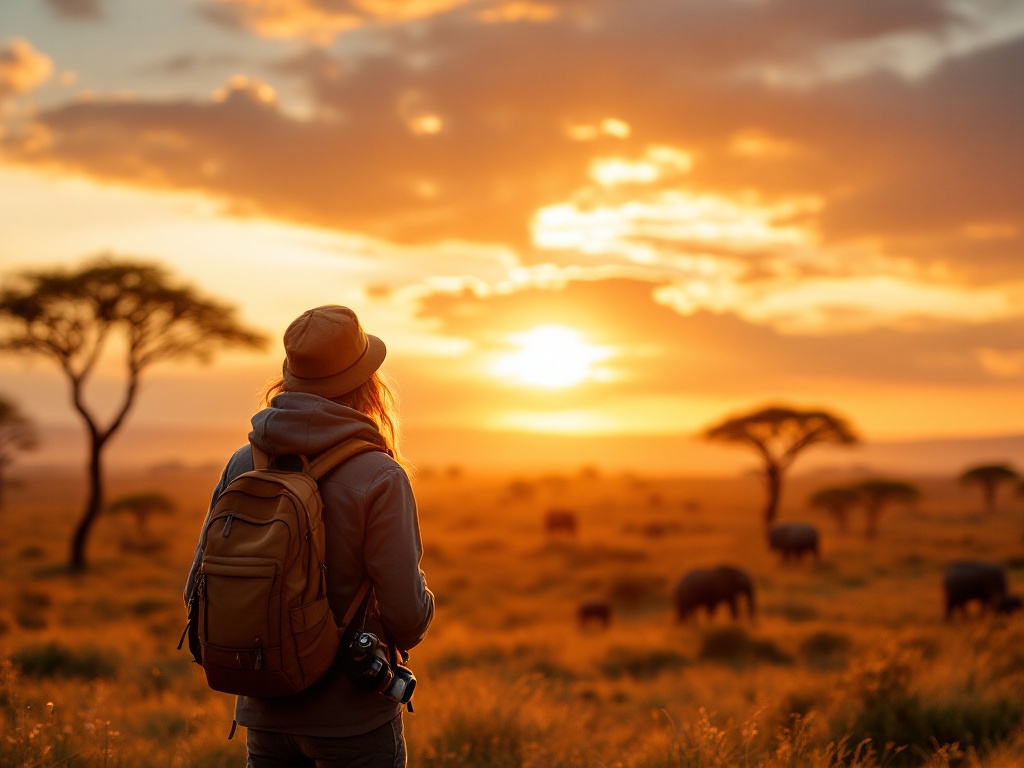
- Research your destinations thoroughly: understand visa requirements, local laws and customs, safety concerns, and health risks, including recommended vaccinations.
- Plan your itinerary carefully: Book flights and accommodation in advance, share your itinerary with someone you trust, and consider organized tours, especially if new to solo travel.
- Prioritize health and safety: Consult your doctor about vaccinations and necessary medications, pack a comprehensive first-aid kit and insect repellent with DEET, and get travel insurance that covers medical emergencies and evacuations.
- Protect your belongings: Use locks, money belts, and secure bags. Avoid displaying expensive items. Keep important documents and cash in a hidden pouch or money belt.
- Respect local customs: Research appropriate attire and learn basic local phrases. This shows respect and can improve your interactions with locals. Consult local guides for valuable insights and safety advice.
Understanding Solo Travel in Africa
Embarking on a solo African adventure can be incredibly rewarding, but meticulous planning is key to a safe and enjoyable trip. Thorough research is paramount, focusing on each country’s unique safety considerations, local customs, and potential health risks. Understanding these factors empowers you to take responsibility for your own well-being. With adequate preparation and awareness, Africa offers amazing experiences for solo travelers. Embrace the journey; be informed and prepared for an unforgettable adventure. Here’s a step-by-step guide to help you plan:
Research your destinations. Learn about visa requirements, local laws, customs, and cultural norms. Identify potential safety concerns and health risks, including recommended vaccinations.
Plan your itinerary. Book flights and accommodations in advance, especially if traveling during peak season. Consider joining organized tours or activities for certain destinations, particularly if you’re new to solo travel.
Pack appropriately. Bring lightweight, versatile clothing suitable for various weather conditions. Don’t forget essential items like a first-aid kit, insect repellent, sunscreen, and any necessary medications.
Stay connected. Invest in a local SIM card or a reliable international roaming plan to stay in touch with family and friends. Share your itinerary with someone at home and check in regularly.
Be mindful of your surroundings. Stay alert and aware of your belongings. Avoid walking alone at night, especially in unfamiliar areas. Trust your instincts and if a situation feels unsafe, remove yourself.
Is Africa Safe for Solo Female Travelers?
Embark on a solo adventure through Africa, a continent brimming with thrilling and safe experiences for women. Countries like Botswana and Namibia, known for their well-established tourism sectors, are especially welcoming. Choosing the right destination is crucial, as is understanding potential risks. Careful planning is key to a safe and rewarding journey. Consider joining organized tours for a secure and social experience, connecting with fellow travelers, enhancing your safety, and sharing unforgettable moments.
Botswana
Botswana offers incredible wildlife viewing opportunities in national parks like Chobe and the Okavango Delta. Experience the thrill of safaris and immerse yourself in the rich culture of the local tribes.
Namibia
Explore the stunning landscapes of Namibia, from the towering dunes of Sossusvlei to the dramatic Etosha National Park. Discover unique desert-adapted wildlife and enjoy the vastness of the Namib Desert.
Step 1: Research Destinations
Thoroughly research potential destinations, considering safety, infrastructure, and activities of interest. Look for destinations known for their stability and established tourism industries.
Step 2: Plan Your Itinerary
Create a detailed itinerary, including accommodation bookings, transportation arrangements, and planned activities. Share your itinerary with a trusted contact at home.
Step 3: Pack Smart
Pack light but include essentials like comfortable walking shoes, appropriate clothing for the climate, a first-aid kit, and any necessary medications. Consider a portable charger for your electronics.
Step 4: Stay Connected
Ensure you have a reliable means of communication, such as a local SIM card or international roaming plan. Inform someone at home of your whereabouts regularly.
Step 5: Be Aware of Your Surroundings
Stay vigilant and aware of your surroundings, especially in crowded areas or at night. Avoid displaying expensive jewelry or electronics and trust your instincts if a situation feels unsafe.
What Are the Common Risks and Precautions?
Planning a solo trip to Africa? Here’s how to ensure a safe and memorable adventure:
Safeguard Your Valuables
Petty theft and scams can occur. Secure your valuables in hidden pouches or hotel safes, and stay aware of your surroundings, especially in crowded areas.
Prioritize Your Health
Consult a healthcare professional well before your trip. Discuss necessary vaccinations and medications, especially for malaria prevention. Pack a well-stocked first-aid kit and consider travel insurance.
Share Your Itinerary
Provide a detailed itinerary to a trusted friend or family member. This ensures someone knows your whereabouts throughout your journey.
Be Mindful of Appearances
Avoid displaying expensive jewelry, electronics, or large amounts of cash. This minimizes attracting unwanted attention and reduces the risk of theft.
Respect Local Customs
Research local customs and laws before you go. Demonstrating respect for local traditions enhances your experience and fosters positive interactions.
How to Use Common Sense to Minimize Risks
If something feels wrong, trust your instincts and leave.
At night, heightened awareness of your surroundings will enhance your safety.
Respecting local customs and dressing appropriately can also minimize unwanted attention.
Researching your destination’s laws and cultural norms beforehand is a wise way to prepare for a safe and enjoyable trip.
Choosing Safe Destinations in Africa
Southern Africa presents a wealth of captivating destinations. Namibia, characterized by its vast deserts and stunning coastline, is a haven for adventurers. Botswana offers a contrasting experience, focusing on the wildlife-rich Okavango Delta, a paradise for nature lovers.
Further north, Uganda provides the remarkable opportunity to trek with endangered mountain gorillas. East Africa also boasts exceptional attractions, such as Zanzibar, a Tanzanian island that seamlessly blends Swahili culture with pristine beaches. South Africa, a land of dynamic cities and diverse cultures, offers both urban exploration and unforgettable wildlife encounters. For safe wildlife viewing, consider a safari in a national park or reserve. These regulated environments, combined with the expertise of guided tours, significantly enhance the experience.
Exploring Botswana, Namibia, and Uganda
Botswana, known for its political stability and low crime rates, is a secure and peaceful destination for solo travelers.
Namibia attracts adventurous women with its captivating landscapes and diverse wildlife.
Uganda offers unique experiences such as gorilla trekking and vibrant cultural immersion, though travelers should always prioritize safety and be mindful of local conditions.
Enjoying Cultural Experiences in Zanzibar and South Africa
Embark on a sensory journey through Zanzibar’s fragrant spice plantations.
Delve into the history of Stone Town, a captivating blend of cultures.
Learning basic Swahili phrases will enhance your Zanzibar adventure.
Respect local customs by dressing modestly, especially at religious sites.
Always request permission before photographing individuals to demonstrate respect for their privacy.
For thrilling escapades, South Africa beckons.
A visit to Robben Island, a testament to human strength, is essential.
Immerse yourself in the country’s rich heritage by exploring its diverse museums and art galleries.
Local guides offer invaluable perspectives, enriching your cultural immersion.
Familiarizing yourself with greetings in South Africa’s eleven official languages is also beneficial.
Wildlife Safaris: Safe and Memorable Adventures
Embark on an unforgettable and secure African safari adventure. With careful planning, you can minimize potential risks and maximize your enjoyment of the continent’s wonders. Lodges prioritize guest safety with robust security measures, including patrols that safeguard against wildlife encounters and other threats.
Essential Safety Tips for Solo Travelers
Choose a safe destination with a good reputation.
Familiarize yourself with local laws and customs to demonstrate respect for the culture.
Register your trip with your government for emergency contact purposes.
Share your itinerary with family or friends, including flight information, accommodations, and planned activities.
Obtain travel insurance to cover unexpected medical expenses, lost luggage, or trip cancellations.
Develop an emergency plan, including contact information for local authorities, your embassy, and personal emergency contacts.
How to Choose Your Destination Wisely
Before traveling, research your destination’s safety, including local customs and secure areas. Consider the political climate, potential health risks, and available transportation. Review any travel advisories issued by your government. Familiarizing yourself with local customs enhances your safety and enriches your travel experience.
Why You Should Register With Your Government
Traveling abroad? Registering with your government offers crucial support during emergencies like natural disasters or political unrest. This enables officials to locate and assist you quickly. It also simplifies communication with your family if they lose contact. Embassies and consulates can provide essential aid, from replacing lost passports to navigating legal issues. Register for peace of mind and practical assistance on your travels.
Benefits of Registration
- Emergency Support: Government registration ensures assistance during crises like natural disasters or political instability, enabling officials to locate and help you swiftly.
- Family Communication: If communication is lost, your registration helps authorities connect you with your family.
Consular Assistance
- Essential Aid: Embassies and consulates can offer crucial support, including replacing lost passports and navigating legal matters.
- Peace of Mind: Registering provides peace of mind and practical assistance during your trip.
Importance of Sharing Your Travel Plans
Share your travel plans with a trusted friend or family member. Include important details like flight numbers, hotel reservations, and planned activities. Regular check-ins with your contact add an extra layer of security during your travels.
Buying Travel Insurance: Why It’s Crucial
Travel insurance is essential for your African adventure. It protects you from unexpected problems like medical emergencies, trip cancellations, and lost luggage. A comprehensive policy covers high medical costs abroad, including hospital stays and emergency medical evacuation. Trip cancellation insurance refunds your prepaid expenses if your trip is canceled or interrupted due to illness, natural disaster, or an airline strike. If your luggage is lost, the appropriate coverage helps replace essential items and documents. Travel insurance offers financial security and peace of mind, especially for solo travelers, allowing you to fully enjoy your African adventure.
Developing an Emergency Plan
Preparing for unexpected situations is essential for a smooth trip. Create a list of important contacts: local emergency services, your country’s embassy or consulate, and family or close friends. Anticipate potential problems like illness, accidents, or lost belongings, and plan how to handle them. Document crucial information such as passport details, insurance policies, and travel itineraries. Store digital copies for easy access, but keep physical copies as a backup.
Compile essential contacts. Create a list that includes local emergency services, your country’s embassy or consulate, and close friends or family.
Anticipate potential issues. Consider possible problems like illness, accidents, or lost belongings, and develop strategies to address them effectively.
Document vital information. Thoroughly record important details like passport details, insurance policies, and travel itineraries. Store digital copies for easy access.
Ensure physical backups. Retain physical copies of your vital information as a backup in case of technology failures.
Preparing for Health and Safety
Before your trip, consult your physician for personalized advice on vaccinations and medications specific to your destination. Pack a comprehensive first-aid kit containing bandages, antiseptic wipes, pain relievers, and any personal medications. Research potential health risks at your destination, such as malaria, yellow fever, or typhoid, and discuss preventative measures with your doctor. These could include insect repellent, mosquito nets, or antimalarial medication. Ensure your travel insurance covers medical emergencies and evacuations. While traveling, stay hydrated, consume safe food and water, and follow local health advisories to minimize potential health risks.
Consulting a Health Professional: Vaccinations and Medications
Planning your African adventure early is crucial for a healthy and enjoyable trip. Consult your doctor or a travel clinic at least eight weeks before departure. They can provide personalized advice on necessary vaccinations, such as yellow fever or typhoid, and review your routine immunizations. Discuss any pre-existing health conditions and current medications with your healthcare provider. Your doctor can also prescribe medications like antimalarials, tailored to your specific itinerary. Finally, pack a well-stocked first-aid kit with essential supplies and all personal prescriptions.
Why You Need a First Aid Kit and Insect Repellent
A well-stocked first aid kit is essential for addressing minor injuries such as cuts, blisters, or sprains. Be sure to pack items like bandages, antiseptic wipes, pain relievers, and any personal medications. Don’t forget insect repellent containing DEET, which provides crucial protection against mosquito-borne illnesses like malaria, dengue fever, and the Zika virus. Having these essentials will contribute to your health and safety during your trip.
- bandages,
- antiseptic wipes,
- pain relievers,
- any personal medications,
- insect repellent containing DEET.
Travel Precautions for Malaria and Other Health Risks
Before embarking on your journey, consult your doctor regarding recommended vaccinations and necessary medications. Pack a comprehensive first-aid kit containing essential personal medications. Ensure access to safe drinking water throughout your trip. Locate nearby healthcare facilities at your destination in advance. Consider acquiring travel insurance that covers medical expenses. Research potential health risks specific to your destination, such as malaria or yellow fever. Pack insect repellent and utilize mosquito nets as needed.
Consult your doctor about recommended vaccinations and necessary medications.
Pack a comprehensive first-aid kit with essential personal medications.
Ensure access to potable water throughout your trip.
Locate nearby healthcare facilities at your destination in advance.
Consider acquiring travel insurance that covers medical expenses.
Research potential health risks at your destination, such as malaria or yellow fever.
Pack insect repellent and use mosquito nets as needed.
Keeping Yourself and Belongings Safe
Protect your valuables: Use locks, money belts, and secure bags to safeguard your possessions. Keep belongings close and avoid displaying expensive items, especially in crowded areas. Consider using a hidden pouch or money belt for extra security.
Manage your money wisely: Carry small amounts of cash and utilize various payment methods like credit cards or traveler’s checks. Never flash large sums of money in public. Secure important documents, including passports and visas, in a money belt or hotel safe.
Dress respectfully: Be mindful of local customs and dress respectfully to avoid attracting unwanted attention. Research appropriate attire for the region you are visiting. This demonstrates cultural sensitivity and can enhance your travel experience.
How to Keep Your Personal Belongings Secure
Use anti-theft bags or backpacks with lockable zippers to protect your belongings.
Store valuable items in your hotel safe.
Carry essential items in a small, cross-body bag.
Leave flashy jewelry and expensive electronics at home.
Use a money belt or hidden pouch for cash and important documents.
Keep your bag close in crowded areas.
Using Locks and Fake Wallets as Theft Prevention
- Safeguard your luggage and backpacks with locks.
- A decoy wallet with a small amount of cash can deter opportunistic thieves.
- Keep your real wallet and valuable documents secure in a money belt or hidden pouch under your clothing.
Managing Cash and Important Documents
Distance is a fundamental concept that separates two points. This separation can be vast, like the gap between stars, or small, like the space between cities. We measure physical distance in units like miles, kilometers, or even light-years. However, distance isn’t just about physical space. It also applies to emotions and ideas. Two people might be physically close, yet emotionally worlds apart. Moreover, distance can represent time itself – the journey from the past to the future. Ultimately, distance is a complex and multifaceted idea.
Dressing Appropriately to Prevent Harassment
Dressing respectfully, in line with local customs, minimizes unwanted attention and fosters positive interactions. This shows cultural sensitivity and contributes to a more enjoyable travel experience.
Getting Around in Africa Safely
Traveling Across Africa: A Guide to TransportationFor traversing the vast distances of Africa, flights offer the quickest solution. If you value exploring at your own pace, a car provides the ultimate freedom. For a scenic and often budget-friendly experience on select routes, consider train travel. Thorough research will help you determine the ideal mode of transport based on your itinerary and budget.
Getting Around
For shorter trips, local buses are a cost-effective option. Choose reputable bus companies and safeguard your belongings. Avoid hitchhiking due to safety concerns; utilize established transport services.
Safety First
Before embarking on your journey, consult your government’s travel advisories for potential risks. Be aware of common tourist scams, such as inflated prices and fake guides. Verify information with official sources for reliable guidance.
Transportation Options: Trains, Cars, and Flights
Traveling within Africa offers diverse transportation options, each with its own advantages and disadvantages:
Train
Train travel provides a scenic and affordable way to explore several African countries. However, schedules can be unreliable, and some routes may be outdated. Weigh your comfort level against your budget and the reliability of the schedules.
Car Rental
Renting a car offers greater flexibility for exploring at your own pace. Plan your routes meticulously, especially in remote areas with potentially challenging road conditions. An international driving permit is often necessary.
Flights
For covering long distances quickly, flying is the most efficient option. Various domestic airlines connect major cities and tourist destinations. Booking flights well in advance is highly recommended, especially during peak season.
Taxis and Ride-hailing Apps
Reputable taxis or ride-hailing apps are generally the safest and most convenient options for shorter trips. They provide a more secure alternative to local buses or hitchhiking.
Tips for Using Local Buses and Avoiding Hitchhiking
Choose a reliable bus operator with a regular timetable.
Double-check the departure times and the route before setting off.
Keep your possessions secure at all times during your trip.
Avoid displaying expensive items like jewelry or electronics.
Be mindful of your surroundings, particularly at bus stations and stops.
Whenever feasible, travel when it’s light for better safety and visibility.
While traveling at night might occasionally be unavoidable, it’s generally recommended to avoid it if possible.
Never resort to hitchhiking, as it is inherently risky and unreliable, potentially putting you in danger and offering no guarantee of reaching your destination on time.
Understanding Local Travel Advisories and Scams
Prioritize your safety by consulting government travel advisories. These resources provide crucial information on security risks, recent incidents, local laws, and health concerns, especially important when traveling to regions like Africa where tourist scams are prevalent. Exercise caution: if a deal sounds too good to be true, it likely is. Be wary of strangers, opt for official transportation, and research accommodations thoroughly. Local guides or trusted residents can offer valuable insights into safe practices and warn about common scams.
Cultural Considerations and Local Advice
Respecting local customs enriches your travel experience and enhances your safety. Research your destination’s cultural norms before you go, including appropriate attire, especially in conservative areas. Understand local greetings and always ask permission before taking photos of people or sacred sites. Learning basic phrases shows respect and strengthens connections. For example, using greetings like “Jambo” in East Africa demonstrates cultural sensitivity.
Local Guides
Local guides offer invaluable insights into customs, traditions, and safety concerns. Their advice enhances both your safety and cultural understanding, providing guidance on appropriate behavior, dress codes, and areas to avoid. They also bridge language gaps and navigate cultural nuances, facilitating smoother interactions.
Language
Learning basic local phrases not only improves communication but also demonstrates respect. Simple greetings, expressions of gratitude, and phrases for asking directions can be incredibly helpful. This effort fosters positive interactions and encourages locals to assist you. Language apps and phrasebooks are excellent resources for acquiring basic vocabulary.
Respecting Local Customs and Norms
Research local customs and dress codes beforehand to avoid unintentional cultural missteps.
Engage respectfully with local communities to build trust and gain valuable safety insights.
Always seek permission before photographing people or sacred sites.
Learn basic local phrases to enhance communication and improve your travel experience.
Stay aware of local laws and regulations, as misunderstandings can occur despite preparation.
Listening to Local Guides and Advice
Local guides offer invaluable insights into local customs and potential hazards, enhancing both safety and cultural understanding. For instance, they can navigate unfamiliar streets, advise on respectful interactions with residents, and help avoid scams. Respecting local customs demonstrates cultural sensitivity and fosters more enriching travel experiences.
Learning Basic Local Languages for Better Interaction
Learning basic phrases can greatly enhance your travels. Even simple greetings like “thank you” demonstrate respect and improve interactions with locals. This also has practical benefits, making navigation, ordering food, and asking for directions much easier. Furthermore, making this effort fosters authentic cultural exchange and creates a more positive and enriching travel experience.

